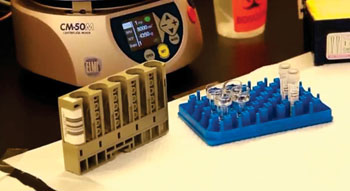Novel Test Differentiates Malignant Prostate Cancer Grades
By LabMedica International staff writers
Posted on 25 May 2016
A promising new test has been introduced that detects prostate cancer more precisely than current tests, by identifying molecular changes in the prostate specific antigen (PSA) protein and can also differentiate between high-risk and low-risk disease, as well as benign conditions.Posted on 25 May 2016
Although widely used, the current PSA test relies on detection strategies that have poor specificity for cancer, 25% of men who have a prostate biopsy due to an elevated PSA level actually have prostate cancer, and an inability to determine the aggressiveness of the disease.

Image: An IsoPSA test for prostate cancer detection and differentiation (Photo courtesy of Dr. Arnon Chait, PhD).
Urologists at the Cleveland Clinic (OH, USA) carried out a clinical trial, which involved six healthcare institutions and 132 patients, to date. It examined the ability of novel test to distinguish patients with and without biopsy-confirmed evidence of cancer. It also evaluated the test's precision in differentiating patients with high-grade (Gleason =7) cancer from those with low-grade (Gleason = 6) disease and benign findings after standard ultrasound-guided biopsy of the prostate. The scientists obtained 99 plasma samples from multiple clinical sites, collected within 30 days prior to prostate biopsy from patients with blood PSA between 2 and 26 ng/mL. The new test was evaluated against 12 core transrectal ultrasonography guided biopsy results as gold standard.
The new test is called the IsoPSA test (Cleveland Diagnostics, Inc, Cleveland, OH, USA) identifies the molecular structural changes in protein biomarkers. It is able to detect cancer by identifying these structural changes, as opposed to current tests that simply measure the protein's concentration in a patient's blood. Substituting the IsoPSA structure-based composite index for the standard PSA resulted in improvement in diagnostic accuracy. Compared with serum PSA testing, IsoPSA performed better in both sensitivity and specificity.
Eric Klein, MD, chair of Cleveland Clinic's Glickman Urological & Kidney Institute, said, “While the PSA test has undoubtedly been one of the most successful biomarkers in history, its limitations are well known. Even currently available prostate cancer diagnostic tests rely on biomarkers that can be affected by physiological factors unrelated to cancer. These study results show that using structural changes in PSA protein to detect cancer is more effective and can help prevent unneeded biopsies in low-risk patients.” The study was presented at the American Urological Association annual meeting held May 6-10, 2016, in San Diego, CA, USA.
Related Links:
Cleveland Clinic
Cleveland Diagnostics











 (3) (1).png)


